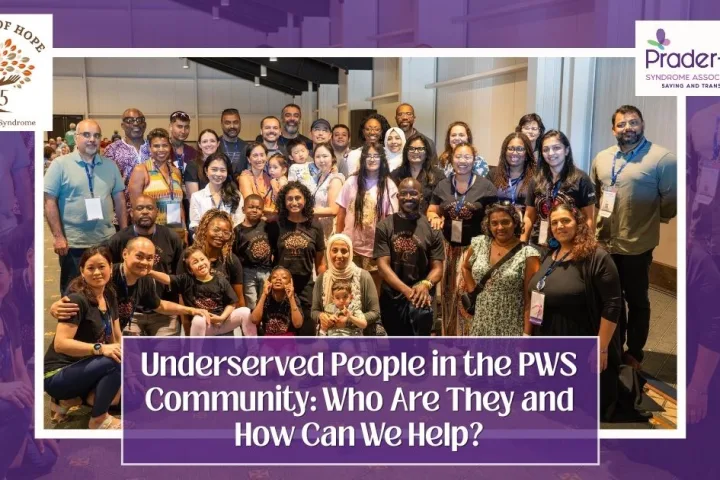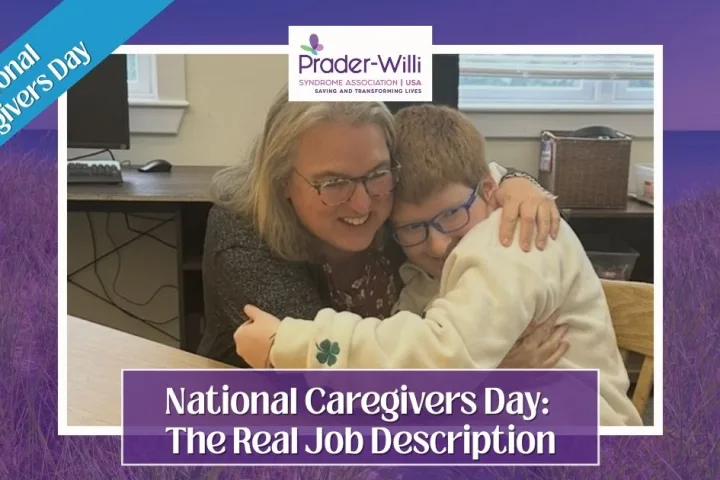It is common to feel sad or discouraged when you are trying to manage a chronic condition like gastroparesis. Like Prader-Willi syndrome, gastroparesis is a multi-faceted condition and must be approached from a variety of angles. A combination of medical treatments, complementary therapies, adequate nutrition, proper dietary modifications, a positive attitude, and supportive lifestyle practices will allow you to manage your loved one’s gastroparesis related stress.
Below are some tips to manage gastroparesis related stress:
- Be prepared: Try to plan ahead with gastroparesis friendly foods and symptom management remedies. Taking time to prepare gastroparesis friendly snacks and remembering any gastroparesis related medication on the go will help make time away from home easier for everyone.
- Be flexible: While there are a number of things you can do to alleviate and prepare for gastroparesis related symptoms, there is a level of uncertainty that comes with living with gastroparesis. The more flexible you can be, the less stressful the unpredictability will be when your preparations do not go as planned.
- Respect your limitations: Expect an ebb and flow in your loved one’s emotions, just as you expect an ebb and flow in their physical symptoms. Not every day is a going to be good day. On their bad days, treat yourself and your child with extra kindness and compassion. Give yourself and your child a break by learning to say no, learning to delegate, and cutting everyone some slack.
- Focus on what you can control: Your child is not responsible for having gastroparesis, but as their caregiver, you are responsible for how you choose to deal with it. And while it might seem like you have very little control over how they will feel day to day, you both have quite a bit more than you think. Concentrate their attention on the things they can do… and do it! Identify their challenges, and then find constructive ways to meet them. Take time to do the things they enjoy that fits into their life with gastroparesis.
- Ask questions: A lot of the fear and anxiety related to gastroparesis is due to uncertainty. When you and your loved one have the knowledge that comes from getting questions answered, it will put your mind and their mind at ease. Call on your child’s medical support team to address any questions and concerns you both may have.
Finally, seeking help from a trusted mental health professional to help you work through your child’s gastroparesis related stress is as therapeutic as any other medical treatment, and many actually help reduce their physical symptoms by reducing their overall stress.
Contributed by Andrea Lucy





 Perry A. Zirkel has written more than 1,500 publications on various aspects of school law, with an emphasis on legal issues in special education. He writes a regular column for NAESP’s Principal magazine and NASP’s Communiqué newsletter, and he did so previously for Phi Delta Kappan and Teaching Exceptional Children.
Perry A. Zirkel has written more than 1,500 publications on various aspects of school law, with an emphasis on legal issues in special education. He writes a regular column for NAESP’s Principal magazine and NASP’s Communiqué newsletter, and he did so previously for Phi Delta Kappan and Teaching Exceptional Children. Jennifer Bolander has been serving as a Special Education Specialist for PWSA (USA) since October of 2015. She is a graduate of John Carroll University and lives in Ohio with her husband Brad and daughters Kate (17), and Sophia (13) who was born with PWS.
Jennifer Bolander has been serving as a Special Education Specialist for PWSA (USA) since October of 2015. She is a graduate of John Carroll University and lives in Ohio with her husband Brad and daughters Kate (17), and Sophia (13) who was born with PWS. Dr. Amy McTighe is the PWS Program Manager and Inpatient Teacher at the Center for Prader-Willi Syndrome at the Children’s Institute of Pittsburgh. She graduated from Duquesne University receiving her Bachelor’s and Master’s degree in Education with a focus on elementary education, special education, and language arts.
Dr. Amy McTighe is the PWS Program Manager and Inpatient Teacher at the Center for Prader-Willi Syndrome at the Children’s Institute of Pittsburgh. She graduated from Duquesne University receiving her Bachelor’s and Master’s degree in Education with a focus on elementary education, special education, and language arts. Evan has worked with the Prader-Willi Syndrome Association (USA) since 2007 primarily as a Crisis Intervention and Family Support Counselor. Evans works with parents and schools to foster strong collaborative relationships and appropriate educational environments for students with PWS.
Evan has worked with the Prader-Willi Syndrome Association (USA) since 2007 primarily as a Crisis Intervention and Family Support Counselor. Evans works with parents and schools to foster strong collaborative relationships and appropriate educational environments for students with PWS. Staci Zimmerman works for Prader-Willi Syndrome Association of Colorado as an Individualized Education Program (IEP) consultant. Staci collaborates with the PWS multi-disciplinary clinic at the Children’s Hospital in Denver supporting families and school districts around the United States with their child’s Individual Educational Plan.
Staci Zimmerman works for Prader-Willi Syndrome Association of Colorado as an Individualized Education Program (IEP) consultant. Staci collaborates with the PWS multi-disciplinary clinic at the Children’s Hospital in Denver supporting families and school districts around the United States with their child’s Individual Educational Plan. Founded in 2001, SDLC is a non-profit legal services organization dedicated to protecting and advancing the legal rights of people with disabilities throughout the South. It partners with the Southern Poverty Law Center, Protection and Advocacy (P&A) programs, Legal Services Corporations (LSC) and disability organizations on major, systemic disability rights issues involving the Individuals with Disabilities Education Act (IDEA), Americans with Disabilities Act (ADA), and the federal Medicaid Act. Recently in November 2014, Jim retired.
Founded in 2001, SDLC is a non-profit legal services organization dedicated to protecting and advancing the legal rights of people with disabilities throughout the South. It partners with the Southern Poverty Law Center, Protection and Advocacy (P&A) programs, Legal Services Corporations (LSC) and disability organizations on major, systemic disability rights issues involving the Individuals with Disabilities Education Act (IDEA), Americans with Disabilities Act (ADA), and the federal Medicaid Act. Recently in November 2014, Jim retired.